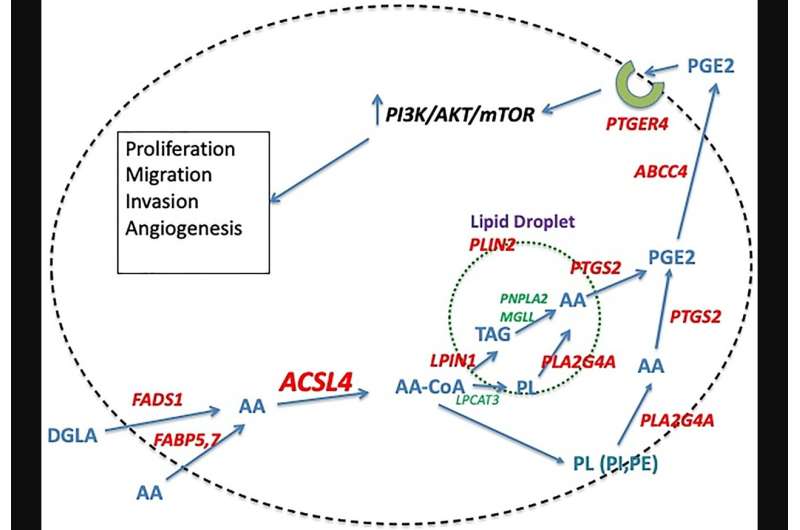This article has been reviewed according to Science X's editorial process and policies. Editors have highlighted the following attributes while ensuring the content's credibility:
fact-checked
peer-reviewed publication
proofread
ACSL4: Biomarker, mediator and target in quadruple negative breast cancer

A new review paper titled "ACSL4: biomarker, mediator and target in quadruple negative breast cancer" has been published in Oncotarget.
Breast cancer is a heterogeneous disease for which effective treatment depends on correct categorization of its molecular subtype. For the last several decades this determination has relied on hormone receptor status for estrogen, progesterone and HER2. More recently, gene expression data have been generated that further stratify both receptor-positive and receptor-negative cancers.
In this new review, researcher Marie E. Monaco from NYU Grossman School of Medicine and VA NY Harbor Healthcare System discusses the fatty acid-activating enzyme, ACSL4, which has been demonstrated to play a role in the malignant phenotype of a variety of cancers, including breast. This lipid metabolic enzyme is differentially expressed as a function of subtype in breast tumors, with highest expression observed in the mesenchymal (claudin low) and basal-like subtypes.
"ACSL4 is one of five mammalian enzyme isoforms responsible for activation (thioesterification) of long-chain fatty acids as a prerequisite to their further utilization in lipid biosynthetic and fatty acid oxidative pathways," explains the researcher.
Here, Dr. Monaco reviews data that support the potential of utilizing ACSL4 status as both a biomarker of molecular subtype and a predictor of response to a variety of targeted and non-targeted treatment regimens. The ability of ACSL4 to induce a more aggressive phenotype suggests it might be a potential target for inhibition in the treatment of breast cancer. Additional studies are needed to demonstrate the utility of this protein as both a biomarker and target in the classification and treatment of breast cancer.
"Based on these findings, we suggest 3 expanded roles for ACSL4: one, as a biomarker for classification of breast cancer subtypes; two, as a predictor of sensitivity to hormone-based and certain other therapies; and three, as a target for the development of new treatment modalities," says Dr. Monaco.
More information: Marie E. Monaco, ACSL4: biomarker, mediator and target in quadruple negative breast cancer, Oncotarget (2023). DOI: 10.18632/oncotarget.28453





















